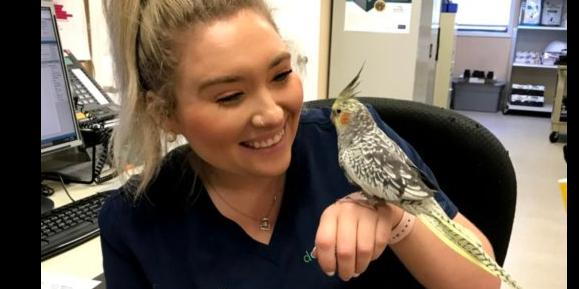
Top 5 Bird Dangers Within Your Home
With everyone staying at home to quarantine, let’s take this opportunity to learn about the common dangers to our pet birds. Then take this information to “bird-proof” your home!
- Fumes & Secondhand smoke
Birds’ respiratory tracts are very sensitive to caustic or irritating particles in the air. Teflon and other nonstick coatings on pots and pans can be a cause of acute death in pet birds. When these coatings are heated to very high temperatures, they release chemical vapors that the birds breathe in and cause fluid to build up rapidly in their lungs. This can cause birds to die almost instantly. Many other aerosols, like cleaners and perfumes, can be very irritating to the airways as well. Cigarette and cigar smoke is also dangerous for birds because they can get secondhand smoke. If a bird perches on a hand or piece of clothing that is covered with nicotine, this can be irritating to the bird’s feet and feathers. The bird will try to groom/preen the substance off, causing possible ingestion as well as trauma to the affected areas. Because of these potential risks, birds should live in smoke-free households.
- Chewing
Birds have a natural instinct to chew on things and manipulate them with their beak and tongue to explore. There are many hazards in our home that would be very dangerous for a bird to chew on, including: electric cords, window sills or baseboards covered in lead paint or other toxins, stained glass items, galvanized wire, batteries, and other objects that contain metals like lead, zinc, and copper. It is important to closely watch your bird whenever they are out of their cage.
- Toxic foods
There are several foods that are toxic to birds that owners should be aware of. These include: apple seeds, avocado, garlic, onion, mushrooms, tomatoes, dried beans, chocolate, caffeine, and alcohol. Although celery itself isn’t bad for birds, the string part of celery can cause crop impactions. Remove the stringy parts from the celery first before feeding. Birds love salty and fatty foods just as much as we do. But for a small bird, a few chips, pretzels, popcorn, etc. can contain potentially toxic amounts of salt that can upset electrolyte balance, leading to excessive thirst, dehydration, and even kidney failure. Similarly, fatty foods can lead to buildup of fat deposits within arteries (atherosclerosis) that can make birds prone to heart disease and stroke.
- Other pets
Many birds live in households with other pets- whether its other birds, or dogs, cats, small mammals, etc. To a lot of these other pets, a bird is seen as a prey species out in the wild. If your bird has free roam of the house, be sure to watch the bird closely when it has access to other pets. Just one small bite or scratch wound from you dog or cat could be deadly to your bird. Not to mention, the bacteria in the mouth of dogs and cats is very different than what birds are used to, and it could be lethal. Birds of different sizes and species should be kept separate from each other. I have seen many large bird attacks on small birds that have ended up being deadly.
- Plants
- Some plants are merely irritating to birds when ingested, while others can cause fatal intoxication. How toxic a plant is for a bird depends upon the plant itself, the amount ingested relative to the size of the bird, and the species of bird. There are several lists that can be found including plants that are usually toxic to all birds, including some popular plants such as nightshade, oak, and poinsettias. Before bringing a plant into your home, make sure it is not potentially poisonous.

